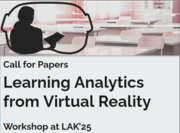 | LAVR@LAK25: Learning Analytics for Virtual Reality 2025 Dublin, Ireland, March 3-7, 2025 |
| Conference website | https://hlostam.github.io/lavr-lak25/ |
| Submission link | https://easychair.org/conferences/?conf=lavrlak25 |
| Poster | download |
| Submission deadline | December 4, 2024 |
| Notifications sent out | December 20, 2024 |
The use of immersive virtual reality (VR) in educational settings is growing. Thanks to rich sensory data that can be collected from VR applications, this presents many opportunities for learning analytics (LA). Building on the successful first LAVR workshop, held within LAK24 in Kyoto, the workshop aims to continue conversations and bring together researchers and practitioners working on topics on the intersection of learning analytics and immersive virtual reality in educational settings. Overall, it aims to advance research on the potential and challenges of rich sensory data generated from VR for learning purposes. The workshop strives to better understand how LA can improve the future design of educational VR applications. Therefore, we call for contributions on the role of LA in foundational research about the VR infrastructure and its multimodal analytics; VR for asynchronous learning experiences; and VR for synchronous learning and teaching.
Submission Guidelines
All papers must be original and not simultaneously submitted to another journal or conference. The following paper categories are welcome:
- Full papers (10-12 pages) describing research with stated methodology and positioned in state-of-the-art.
- Short papers (5-9 pages) more novel work, might be narrower in scope or work-in-progress that is likely to generate discussions at the workshop between the participants.
- Position papers (5-6 pages) introducing new points of view in the workshop topics or summarising the experience of a group in the field, also welcome practitioner reports describing experience or challenges of using and implementing analytics in virtual reality in education.
Further, based on the feedback from last year, we accept project and demo submissions to strengthen the link between research and practitioners. These have lower requirements without the need for rigorous evaluation required for research papers. As such they do not meet the requirements needed for publishing in CEUR proceedings. Those will be given space to present at the workshop and the short contribution will be published on this website.
- Project description (1-2 pages) in their initial stages that can demonstrate their innovative potential for further analytics
- Demos (1-2 pages + video) showcasing the combined potential of VR and analytics.
List of Topics
- Objective vs subjective data analysis
- Effective visualization of data coming from VRs
- Privacy and security concerns of using LA from VR in education
- Challenges of algorithmic biases and unintended consequences of LA in VR
- Scalability, availability, and shareability aspects of LA for VRs
- Data preparation and challenges of VR for LA (e.g. multiple sensor merging)
- Student/teacher acceptance and perception of using VR for LA
- LA for the design of VR environments and learning experiences
- LA for performance measurement and evaluation of learning in/with VR
- LA for improving inclusion, equity, and diversity in VR learning environments
- LA for supporting individualized learning processes in VR environments
- LA for enabling and enhancing collaborative learning in VR environments
- LA for supporting the integration of VR in hybrid learning environments
- LA for empowering instructors in VR learning environments
- LA for supporting the integration of Generative AI in VR learning environments
- LA for educational 360-degree videos
Committees
Program Committee
- Geoffray Bonnin, Université Lorraine, Franc
- Mamta Shah, Elsevier, USA
- Egon Werlen, IFeL, Swiss Distance University of Applied Science, Switzerland
- to be added continuously
Organizing Committee
- Martin Hlosta, Swiss Distance University of Applied Science, Switzerland
- Ivan Moser, Swiss Distance University of Applied Science, Switzerland
- Amir Winer, Open University of Israel, Israel
- Nitza Geri, Open University of Israel, Israel
- Birte Heinemann, RWTH Aachen, Germany
- Sergej Görzen, RWTH Aachen, Germany
- Mafor Penn, University of Johannesburg
- Umesh Ramnarain, University of Johannesburg, South Africa
- Christo van der Westhuizen, University of Johannesburg, South Africa
Publication
Same as last year, the research papers of LAVR@LAK25 will be submitted for inclusion in a CEUR-WS volume (and indexed on Google Scholar, DBLP, and Scopus
Venue
The workshop will be held in Dublin, Ireland, 03-04 March 2025, as part of LAK25 conference
Contact
All questions about submissions should be emailed to martin.hlosta@ffhs.ch and amirwi@openu.ac.il and mark the subject as LAVR25.
